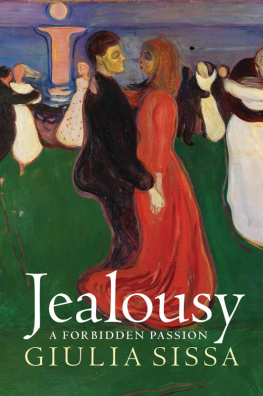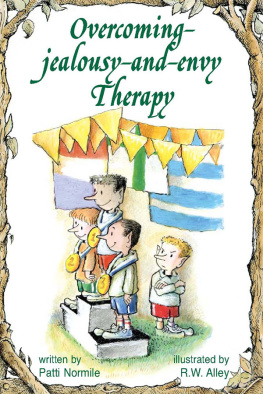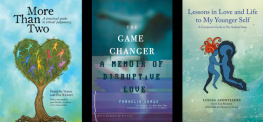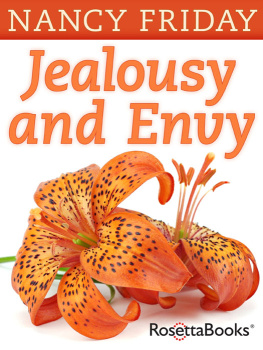Sissa - Jealousy: a Forbidden Passion
Here you can read online Sissa - Jealousy: a Forbidden Passion full text of the book (entire story) in english for free. Download pdf and epub, get meaning, cover and reviews about this ebook. City: Newark, year: 2017, publisher: Polity Press, genre: Science. Description of the work, (preface) as well as reviews are available. Best literature library LitArk.com created for fans of good reading and offers a wide selection of genres:
Romance novel
Science fiction
Adventure
Detective
Science
History
Home and family
Prose
Art
Politics
Computer
Non-fiction
Religion
Business
Children
Humor
Choose a favorite category and find really read worthwhile books. Enjoy immersion in the world of imagination, feel the emotions of the characters or learn something new for yourself, make an fascinating discovery.
Jealousy: a Forbidden Passion: summary, description and annotation
We offer to read an annotation, description, summary or preface (depends on what the author of the book "Jealousy: a Forbidden Passion" wrote himself). If you haven't found the necessary information about the book — write in the comments, we will try to find it.
Sissa: author's other books
Who wrote Jealousy: a Forbidden Passion? Find out the surname, the name of the author of the book and a list of all author's works by series.
Jealousy: a Forbidden Passion — read online for free the complete book (whole text) full work
Below is the text of the book, divided by pages. System saving the place of the last page read, allows you to conveniently read the book "Jealousy: a Forbidden Passion" online for free, without having to search again every time where you left off. Put a bookmark, and you can go to the page where you finished reading at any time.
Font size:
Interval:
Bookmark:


First published in French as La jalousie: une passion inavouable, Odile Jacob, 2015
This English edition Polity Press, 2018
Polity Press
65 Bridge Street
Cambridge CB2 1UR, UK
Polity Press
101 Station Landing
Suite 300,
Medford, MA 02155
USA
All rights reserved. Except for the quotation of short passages for the purpose of criticism and review, no part of this publication may be reproduced, stored in a retrieval system or transmitted, in any form or by any means, electronic, mechanical, photocopying, recording or otherwise, without the prior permission of the publisher.
ISBN-13: 978-1-5095-1184-6
ISBN-13: 978-1-5095-1185-3 (pb)
A catalogue record for this book is available from the British Library.
Library of Congress Cataloging-in-Publication Data
Names: Sissa, Giulia, 1954- author.
Title: Jealousy : a forbidden passion / Giulia Sissa.
Description: Malden, MA : Polity, 2017. | Includes bibliographical references and index.
Identifiers: LCCN 2017025320 (print) | LCCN 2017038667 (ebook) | ISBN 9781509511877 (Mobi) | ISBN 9781509511884 (Epub) | ISBN 9781509511846 (hardback) | ISBN 9781509511853 (paperback)
Subjects: LCSH: Jealousy. | Love. | Semiotics. | BISAC: LITERARY CRITICISM / Semiotics & & Theory.
Classification: LCC BF575.J4 (ebook) | LCC BF575.J4 S57 2017 (print) | DDC 152.4/8dc23
LC record available at https://lccn.loc.gov/2017025320
Typeset in 10.5 on 12 pt Sabon by Toppan Best-set Premedia Limited
Printed and bound in the UK by CPI Group (UK) Ltd, Croydon
The publisher has used its best endeavours to ensure that the URLs for external websites referred to in this book are correct and active at the time of going to press. However, the publisher has no responsibility for the websites and can make no guarantee that a site will remain live or that the content is or will remain appropriate.
Every effort has been made to trace all copyright holders, but if any have been inadvertently overlooked the publisher will be pleased to include any necessary credits in any subsequent reprint or edition.
For further information on Polity, visit our website:
politybooks.com
I am Beside Myself with Anger
Love gives us pleasure. Love makes us suffer. What turns exaltation into distress, trust into anguish, serenity into despair, is very often jealousy.
A sullen and sorrowful fantasy; a cruel and petty passion; the confession of a secret indignity; a forced feeling of how little one is worth; the agony of an indigent and miserly creature who is afraid to lack; a symptom which betrays a distrust in one's own merit and reveals the superiority of a rival; an anxiety which usually hastens the very evil it dreads; an emotion so base that it has to be hidden; a foolish pride, a feeble love, a wicked heart and a ludicrous bourgeois absurdity; a prejudice created by education and enhanced through habit; a pathology of the imagination; the projection of an unconscious penchant for infidelity; repressed homosexual urges converted into paranoia; a failing phallus, problematic narcissism, deep self-hatred, poor self-esteem, insecurity, envy.
Blame is unleashed. Contempt roams free. Laughter resounds. No one would boast of being jealous. Pride, like other passions, claims Franois de La Rochefoucauld in one of his famous Maxims, has peculiarities of its own; while we are jealous, we feel ashamed to confess our jealousy, but when it is past we are proud of it and our capacity to feel it.
That says it all.
How many of us, during the course of our lives, could swear to never having experienced such shame? I, for one, must plead guilty. It is terrifying to call myself jealous. To the extreme numbness which comes upon you when a love eludes you and a life together disintegrates, jealousy adds the burden of humiliation. All the connections, familiar and unnoticed, which have bound together the habits and the hours suddenly dissolve. All the mundane small gestures of everyday intimacy remain, suddenly, in suspense. And even if this love was more of an ephemeral liaison than a common life, that does not prevent us from being thrown into disarray. Lies destroy confidence. The more we are surprised, the more we suffer. Our material, social or professional conditions may not change dramatically that much we know yet nothing will ever be the same as it once was. There will be nothing more. And, in addition to nothingness the shame.
I have known this shame. In the midst of the anguish, however, I also felt a strong sentiment of injustice. Why should the victim (for such one is) of an infidelity also have to bow down before this additional suffering? Whether he or she turns, in search of consolation, to philosophy or appeals to the various therapies of the soul, anyone who admits to being jealous will be very ill-received. The repertoire of available ideas is monotonous. The great pontiffs of the social sciences, of moral philosophy, of political theory and of psychology compete in speaking ill of amorous jealousy. It comes as no surprise that one hides, blushes, denies and proclaims with one voice: Jealous? What, me? Never!
I wanted to rebel against this nonsense. I wanted not only not to be silent, to attenuate or to embellish my jealousy but to recognize it for what it is without euphemisms, without denials, without any kind of kitsch Stoicism. And I wanted to think jealousy historically. What, I asked myself, has happened to our experience of love that we have come to be ashamed to admit to what is, above all, a form of suffering? Has it always been improper to assert one's erotic dignity?
Duelling is no more, and crimes of honour have been outlawed. Adultery is no longer the end of the world, seduction is practised openly and desire circulates widely. We enter freely into erotic contracts. All of this is marvellous. But, in this casual and plural euphoria, the jealous and, above all, jealous women are alone. The disapproval once attached to sex has now been transferred to love. Love is a desire for reciprocity, in the singular. Love is the desire for desire. Love is therefore jealousy but you must not say so.
Jealousy is a forbidden passion.
It has not always been so. It has become so. I have, therefore, dared to attempt what the great eighteenth-century philosopher Charles de Secondat, baron de Montesquieu, had intended to do had begun but never finished namely to write a history of jealousy. In doing so I discovered a curious fact. The ignominy which moralists of all stripes have attributed to the emotion itself is, on reflection, the predictable response to a massive cultural repression. We are ashamed only because we are made to feel so. We are afraid to look bad because we have been intimidated. We are afraid of ridicule because we have been ridiculed. We conceal our feelings because we lack the strength to suffer cruel comments, condescending advice or knowing smiles. Shame is a social passion.
Like all emotions, whose cultural subtleties we understand better and better, jealousy calls for careful thought. I'm not the first to become interested in it. Far from it. The philosophical and literary representations of jealousy are both immensely rich and very ancient. If we look at jealousy from the perspective of the seventeenth century we will discover that this emotion, for which La Rochefoucauld offers a brilliantly condensed description, is characterized by an altogether peculiar feature. On the one hand, unlike other states of mind such as courage or emulation, about which one is eager to brag, jealousy is a source of embarrassment, which demands discretion. We are ashamed to confess [
Next pageFont size:
Interval:
Bookmark:
Similar books «Jealousy: a Forbidden Passion»
Look at similar books to Jealousy: a Forbidden Passion. We have selected literature similar in name and meaning in the hope of providing readers with more options to find new, interesting, not yet read works.
Discussion, reviews of the book Jealousy: a Forbidden Passion and just readers' own opinions. Leave your comments, write what you think about the work, its meaning or the main characters. Specify what exactly you liked and what you didn't like, and why you think so.












